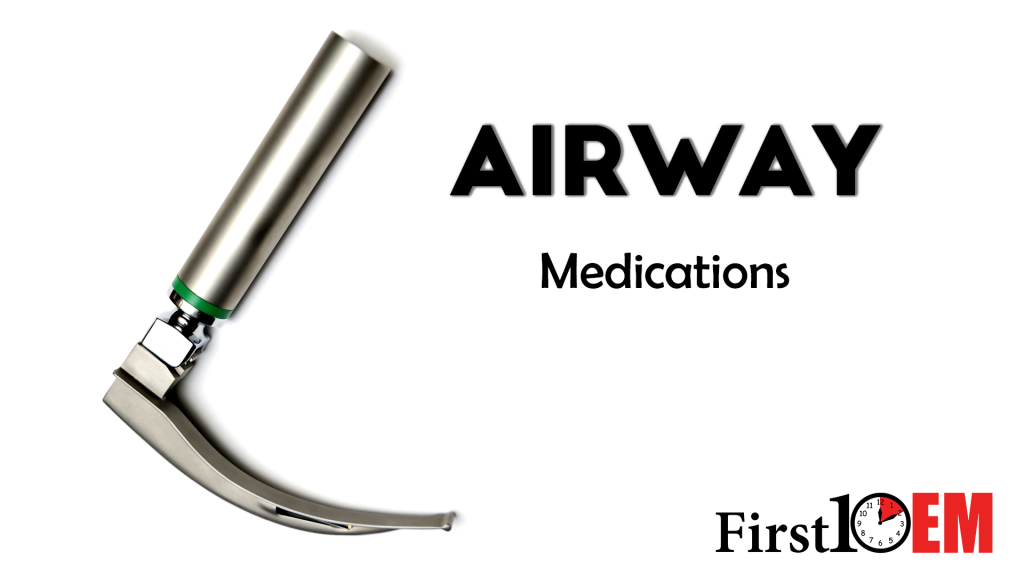A quick summary of commonly used airway medications that accompanies the emergency airway management series.
- Part 1: Optimizing the basics
- Part 2: Is this patient ready for intubation?
- Part 3: Intubation
- Part 4: Cricothyroidotomy
- Part 5: Post intubation care
Sedatives
Etomidate
- Dose: 0.3 mg/kg IV (20 mg in a 70kg adult)
- Onset: 30-45 seconds
- Duration: 5-10 minutes
- Considerations: Biochemically, etomidate causes adrenal suppression, but that doesn’t seem to result in any clinically important outcomes. Can result in myoclonus, which can be detrimental when using etomidate for procedural sedation.
Ketamine
- Dose: 1-2 mg/kg IV
- Onset: 30-45 seconds
- Duration: 10-20 minutes
- Considerations: This is a PCP derivative. It is a dissociative agent that provides both analgesia and sedation. Ketamine generally the agent of choice in asthma. There used to be concern that ketamine raised ICP and so it was contraindicated in head injury patients, but that myth has been reasonably debunked. The major disadvantages of ketamine are hypersalivation and occasionally laryngospasm.
Propofol
- Dose: 1-2 mg/kg IV push
- Onset: 45-60 seconds
- Duration: 3-10 minutes
- Considerations: Very rapid onset and very short duration of action. The most important side effect is hypotension.
Paralytics
Succhinylcholine
- RSI Dose: 1.5 – 2 mg/kg IV
- Onset: 45-60 seconds
- Duration: 5-10 minutes
- Considerations: A depolarizing paralytic (binds to the motor end-plate, causing depolarization, which leads to brief muscle fasciculations). Will cause a transient rise in potassium. Use with caution in those on dialysis, crush injuries or burns more than 24 hours old, or muscular dystrophy. Sux must also be avoided in patients with a history of malignant hyperthermia.
Rocuronium
- RSI Dose: 1.2 – 1.5 mg/kg IV
- Onset: 45-60 seconds
- Duration: 30-45 minutes
- Considerations: A non-depolarizing paralytic (competitive inhibitor that competes for motor end plate sites with acetylcholine). Results in a much longer duration of paralysis than succinylcholine, and has a longer duration of action than our RSI sedatives, meaning you have to be very careful to remember to provide ongoing analgesia and sedation.
Possible Pre-Medications
There is no evidence that any pre-medication results in better outcomes for the patient.
Lidocaine
- Dose: 1.5 mg/kg IV
- Onset: 3 minutes
- Duration: 20 minutes
- Given to blunt airways reflex induced increased intracranial pressure or bronchospasm
Fentanyl
- Dose: 1.5-6 mcg/kg IV
- Onset: 3 minutes
- Duration: 30 minutes
- Given to prevent a rise in ICP with RSI
Post-intubation Medications
Fentanyl
- Bolus dose: 25-100 mcg every 3-5 minutes
- Infusion dose: 100-500 mcg/hour
- Onset: 3 minutes
- Duration: 30 minutes
- Major side effect is hypotension. Can cause chest wall rigidity if large doses are pushed fast.
Propofol
- Bolus dose: 0.25-0.5 mg/kg every 1 minutes
- Infusion dose: 0.5-5 mg/kg/hour
- Onset: 1 minutes
- Duration: 15 minutes
- Major side effect is hypotension. Prolonged infusions can also result in propofol infusion syndrome.
Ketamine
- Bolus dose: 0.25-1 mg/kg every 3-5 minutes
- Infusion dose: 0.1-1 mg/kg/hour
- Onset: 1 minutes
- Duration: 15 minutes
- Major side effects are hypertension, tachycardia, and hypersalivation.
Midazolam
- Bolus dose: 1-5 mg every 3-5 minutes
- Infusion dose: 5-10 mg/hour
- Onset: 3 minutes
- Duration: 20-30 minutes
- Major side effect is hypotension.
Dexmedetomidine
- Bolus dose: 0.5-1 mcg/kg every 3-5 minutes
- Infusion dose: 0.2-1.4 mcg/kg/hour
- Onset: 5-10 minutes
- Duration: 60-120 minutes
- Not available in most emergency departments. Can cause hypotension and bradycardia.

